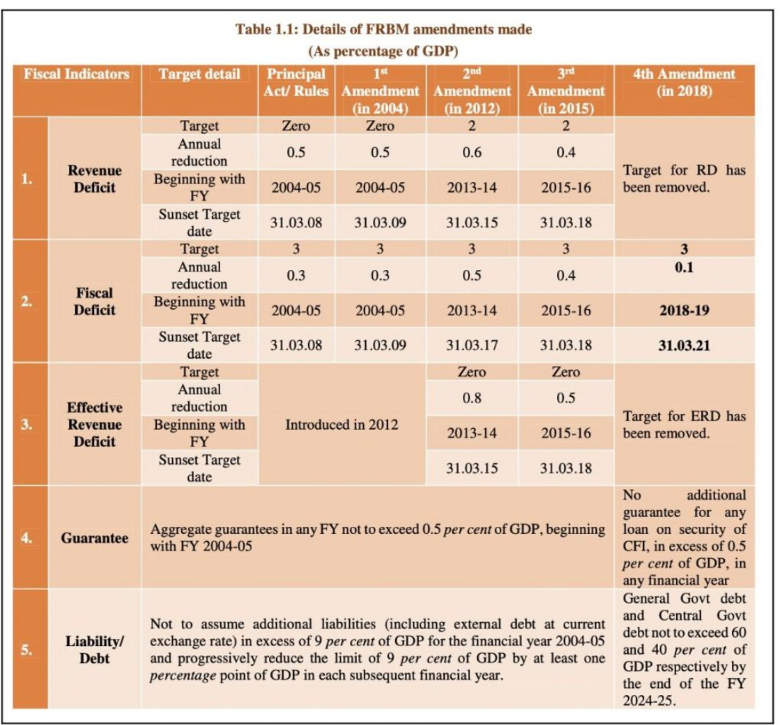FRBMA stands for the Fiscal Responsibility and Budget Management Act enacted in 2003, aims to promote fiscal discipline, transparency, and accountability in the management of the India’s finances.
Fiscal Responsibility and Budget Management Act, 2003 is regulated by Department of Economic Affairs, Ministry of Finance.
Fiscal Responsibility and Budget Management Act ,2003 ensure intergenerational equity in fiscal management and long-term macro-economic stability by reducing fiscal deficit. It further ensure effective conduct of monetary policy and prudential debt management consistent with fiscal sustainability.
Contents
FRBM Act: Provisions
The Central Government shall,-
(a) take appropriate measures to limit the fiscal deficit upto three per cent of gross domestic product by the 31st March, 2021;
(b) endeavor to ensure that-
(i) the central Government debt does not exceed sixty per cent.
(ii) the Central Government debt does not exceed forty per cent of gross domestic product by the end of financial year 2024-2025.
(c) not give additional guarantees with respect to any loan on security of the Consolidated Fund of India in excess of one-half per cent of gross domestic product, in any financial year.
(d) endeavour to ensure that the fiscal targets specified in clauses (a) and (b) are not exceeded after stipulated target dates.
FRBM Act: Significance
Fiscal discipline: The FRBMA promotes fiscal discipline by setting up the targets for reducing the fiscal deficit and by mandating the constitution of a Fiscal Responsibility and Budget Management Committee (FRBMC) to review the government’s fiscal performance.
Fiscal transparency: The FRBMA promotes transparency and accountability of public finances through publication of various reports, such as the annual budget, the medium-term fiscal policy statement, and the Fiscal Policy Strategy Statement.
Macroeconomic stability: The FRBMA aims to maintain macroeconomic stability by ensuring that the government’s fiscal policies are sustainable and do not lead to high levels of public debt.
Investor confidence: The FRBMA helps to boost investor confidence in the Indian economy by transparency and compliance and demonstrating the government’s commitment to fiscal discipline and macroeconomic stability.
Long-term planning: The FRBMA requires the government to present a medium-term fiscal policy statement and an FPSS, which helps in long-term planning and ensures that the government’s fiscal policies are aligned with its future economic goals.
FRBM Act: Amendments
Since the enactment of the FRBM act in 2003, it was amended 4 times – 2004, 2012, 2015 & 2018. The FRBM Act and the Rules underwent more significant changes during the 4th Amendment, in 2018.
Source – Report of the CAG on Compliance of the FRBM Act, for year 2018-19
FRBM Act:Targets for Budget 2023
- Medium Term Fiscal Policy Statement in both 2021-22 and 2022-23 did not provide the rolling targets for budget deficits.
- In Budget 2022 government aims to reduce the fiscal deficit to below 4.5% of GDP by 2025-26.
- The estimated fiscal deficit target for 2023-24 is 5.9% of GDP. It indicates borrowings done by the government is to finance its expenditure.
- The estimated revenue deficit for 2023-24 is 2.9% of GDP. It tells about the government’s need to borrow funds to meet expenses and it may not provide future returns.
- As per the budget 2023-24, interest payments as a percentage of revenue receipts is expected to be 43% in 2022-23.
FRBM Act: N.K.Singh Committee Recommendations
Fiscal Responsibility and Budget Management Committee was constituted under the chairmanship of N.K.Singh to review the government’s fiscal performance and make recommendations to FRBM Act.
- Debt to GDP ratio: The Committee suggested using debt as the primary target for fiscal policy. A debt to GDP ratio of 60% should be targeted with a 40% limit for the centre and 20% limit for the states.
- To achieve the targeted debt to GDP ratio, it proposed yearly targets to progressively reduce the fiscal and revenue deficits till 2023
- The Committee proposed to create an autonomous Fiscal Council with a Chairperson and two members appointed by the centre.
- The Committee noted that under the FRBM Act, the government can deviate from the targets in case of a national calamity, national security or other exceptional circumstances notified by it.
- Further, the government may be allowed to deviate from the specified targets upon the advice of the Fiscal Council in the following circumstances: (i) considerations of national security, war, national calamities and collapse of agriculture affecting output and incomes, (ii) structural reforms in the economy resulting in fiscal implications, or (iii) decline in real output growth of at least 3% below the average of the previous four quarters. These deviations cannot be more than 0.5% of GDP in a year.
- The Committee recommended that the 15th Finance Commission (which is also led by N.K.Singh) should be asked to recommend the debt trajectory for individual states.







